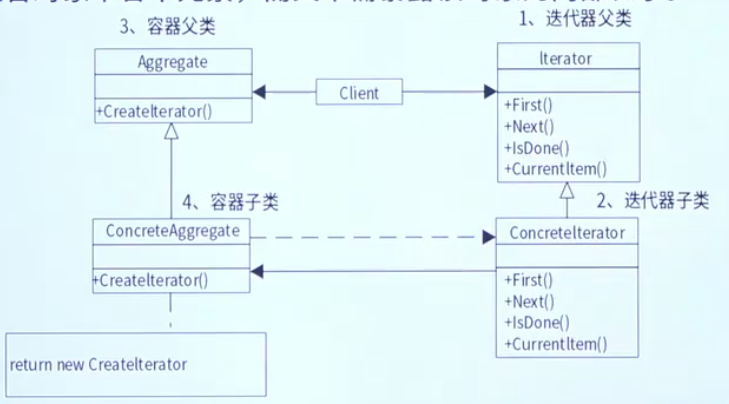迭代器模式
提供一种统一的方法顺序访问容器对象中各个元素,而又不暴露该对象的内部细节,容器对象指数组、集合等
数据集
核心概念
![迭代器模式]()
- Iterator 迭代器接口,定义next和hasNext方法
- ConcreteIterator 具体的迭代器实现
- Collection 容器接口,定义iterator方法来创建Iterator对象
- ConcreteCollection 容器实现类,创建具体的迭代器对象ConcreteIterator
1
2
3
4
5
6
7
8
9
10
11
12
13
14
15
16
17
18
19
20
21
22
23
24
25
26
27
28
29
30
31
32
33
34
35
36
37
38
39
40
41
42
43
44
45
46
47
48
49
50
51
52
53
54
55
56
57
58
59
60
61
62
63
64
65
66
67
68
69
70
71
72
73
74
75
76
77
78
79
80
81
82
83
84
85
86
87
88
89
90
91
92
93
94
95
96
97
|
public interface Iterator<E> {
void first();
E next();
boolean hasNext();
}
public class ConcreteIterator<E> implements Iterator<E>{
private ConcreteCollection<E> collection;
private int index = 0;
public ConcreteIterator(ConcreteCollection<E> collection){
this.collection = collection;
}
@Override
public void first() {
index = 0;
}
@Override
public E next() {
int i = index;
if(hasNext()){
index = i+1;
return collection.get(i);
}
return null;
}
@Override
public boolean hasNext() {
if(index == collection.size()){
return false;
}
return true;
}
}
public interface Collection<E> {
Iterator<E> iterator();
}
public class ConcreteCollection<E> implements Collection<E>{
private E[] arrays;
public ConcreteCollection(E[] arrays){
this.arrays = arrays;
}
@Override
public Iterator<E> iterator() {
return new ConcreteIterator<>(this);
}
public E get(int index){
E ele = null;
if(index < arrays.length){
ele = arrays[index];
}
return ele;
}
public int size(){
return arrays.length;
}
}
|
优缺点
优点
缺点
使用场景
- 访问一个聚合对象的内容而无须暴露它的内部表示
- 支持对聚合对象的多种遍历
- 为遍历不同的聚合结构提供一个统一的接口
